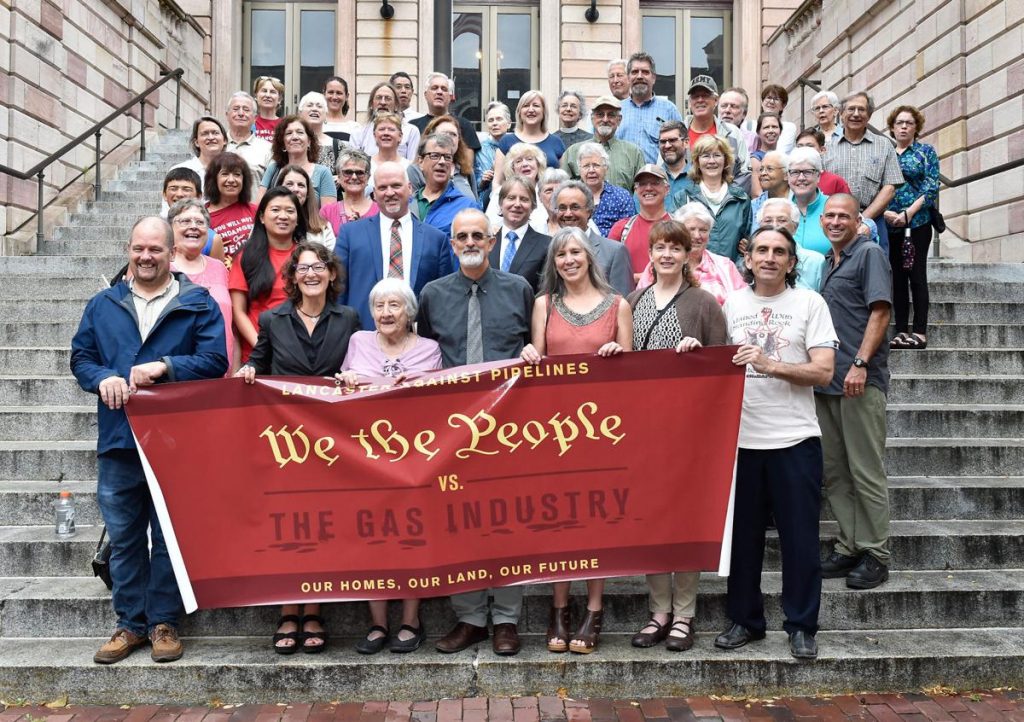
by LNP Editorial Board
July 11, 2019
https://lancasteronline.com/opinion/editorials/judge-in-pipeline-case-offers-some-useful-advice-about-how/article_bfbe09d2-a36c-11e9-b08c-5fce4c73ac80.html
THE ISSUE
The Lancaster County District Attorney’s Office dismissed trespassing charges Monday against seven people who participated in a 2017 protest at an Atlantic Sunrise pipeline site. “As part of the arrangement,” LNP’s Lindsey Blest reported, “the defendants collectively completed more than 50 hours of community service Saturday at Climbers Run Nature Preserve.” County Judge Howard Knisely accepted the motion to dismiss the charges against the seven people, who included four from Lancaster County: Malinda Clatterbuck, of Holtwood; Ann De Vitry, of Columbia; Darrell Yoder, of Lancaster; and Elam Zook, also of Lancaster.
In October 2017, 22 adult protesters were arrested on a piece of West Hempfield Township farmland owned by the Adorers of the Blood of Christ, an order of Roman Catholic nuns. Part of the nuns’ property had been seized by eminent domain to build the Atlantic Sunrise pipeline.
The protesters believed that eminent domain had been inappropriately and unjustly applied to the nuns’ property. They asserted that the pipeline would harm the environment.
So they linked hands and attempted to block heavy equipment from beginning construction. They did not damage the property or pipeline equipment. Theirs was an act of civil — emphasis on the civil — disobedience. Nevertheless, they were trespassing and were arrested for that offense.
Thirteen pleaded no contest; two entered the state’s Accelerated Rehabilitative Disposition program for first-time offenders; and seven pleaded not guilty and saw their charges dismissed Monday.
They took a stand. They had their say. Prosecutors came to a reasonable judgment and the judge agreed to it. The system worked.
Before we move on, however, we should consider the message Judge Knisely delivered in his ruling.
It merits our consideration.
Knisely pointed out that he had to rule based on his interpretations of “the law and precedent in the area of criminal law as presented to me.”
He continued: “My rulings are in no way contrary to anyone’s First Amendment rights to protest. Having been involved with protests since the late 1960s, we realized that peaceful, nonviolent protest is something that the United States permits and encourages more than any other place on this planet.
“There are, however, under the criminal law, limitations to even peaceful protesting. Such was the case here.
“Rules and laws as put in place by our Legislature control those limitations, as well as federal over state’s rights issues. Those are the bodies, not the courts, where changes to the laws and limitations to prevent the abuse of our environment and safety concerns become law.”
Then came Knisely’s kicker: “We must all be more vigilant to elect to those legislative positions persons who are highly concerned with their local constituents and local problems, and not those who merely look for personal advancement, or who look to industry to fill their coffers for reelection.”
The Lancaster County delegation to Harrisburg consists of 13 lawmakers; we also sent a lawmaker to Congress. Was Knisely aiming his remarks at any of them, or was he merely waxing philosophical?
Might the judge have been thinking of state Sen. Scott Martin?
We ask this not because of Knisely’s line about lawmakers who “merely look for personal advancement.” (Show us a politician who’s not ambitious.)
But because Martin has proposed legislation that could have a chilling effect on the constitutional right to protest — an issue Knisely was addressing.
Senate Bill 323 would require a participant in a public protest to pay for a police department’s costs of responding to a demonstration if, “in connection with the demonstration, the person is convicted of a felony or misdemeanor offense.”
It was inspired, by Martin’s own admission, by the Dakota Access Pipeline protests that cost taxpayers millions in several Midwestern states. Martin feared that construction of the Atlantic Sunrise pipeline might spur similarly costly protests here. He says he’s trying to save taxpayers money. He might have asserted his case more convincingly if he had refused contributions from energy interests.
The reality is that judges already have the ability to impose costs on protesters who commit crimes.
We fear that if enacted into law, Martin’s legislation would intimidate those who otherwise might peacefully protest.
That’s the worry of those who were involved in the pipeline protests here. And they weren’t the only ones concerned.
Is Judge Knisely concerned, too? He noted that the laws he must consider in his courtroom are written in the Legislature. And he urged us all to “be more vigilant” about those whom we elect to write those laws.
We’ve lauded Sen. Martin for some of his legislative efforts, particularly those aimed at curtailing gambling in Lancaster County. But in his zeal to get things done in Harrisburg, he’s reminded us occasionally of the proverbial bull in the china shop — and with HB 323, what stands to be broken is the First Amendment.
He should drop this bill, which seems designed mostly to benefit the pipeline industry, and direct his energy, as Knisely put it, “to local constituents and local problems.”